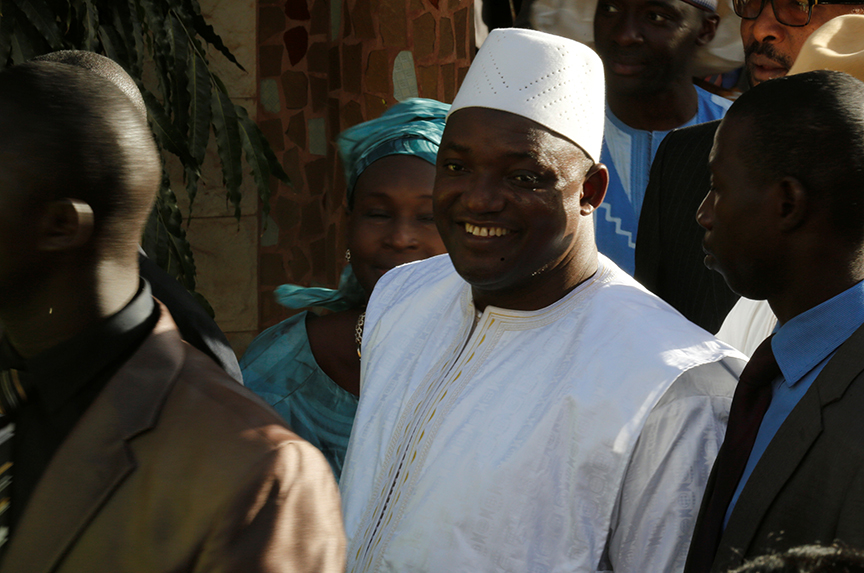 Even as Donald Trump was preparing for his inauguration as the next president of the United States, a more contentious transition of power was being attempted in the Gambia, where the incumbent president, Yahya Jammeh, has stubbornly refused to make way for President-elect Adama Barrow.
Even as Donald Trump was preparing for his inauguration as the next president of the United States, a more contentious transition of power was being attempted in the Gambia, where the incumbent president, Yahya Jammeh, has stubbornly refused to make way for President-elect Adama Barrow.
Senegalese forces under the umbrella of Economic Community of West African States (ECOWAS), a regional bloc, entered the Gambia on January 19 to assure the democratic transition from Jammeh to Barrow, who won the presidential elections in December.
If it goes awry, the military intervention in the Gambia could present an early crisis for Trump, but the new US administration must avoid the temptation of getting its wires crossed with ECOWAS. It should, instead, support ECOWAS’ efforts to resolve the crisis, an example of the Western mantra “African solutions for African problems.” The United States must publicly support a peaceful transition of power in the Gambia and offer its full support to Barrow, who will need all the help he can get.
Barrow has been in Senegal for the past week, and was sworn in on January 19 in the Gambian Embassy in Dakar.
While Jammeh initially conceded the election, he reneged a week later, plunging the Gambia into a political crisis that has attracted the attention not only of the region, but of the entire continent. After failed diplomatic efforts to convince Jammeh to leave power peacefully, ECOWAS’ military intervention is a key test for West Africa’s resolve to enforce election results.
Jammeh, notorious as much for his graphic threats against gays and his bizarre herbal “cures” to various ailments as for his ruthless suppression of dissent and opposition, has been president since he took power in a coup in 1994. In recent weeks, a spate of high-level diplomatic defections weakened his government. The Gambia’s army chief has also reportedly jumped ship, and is quoted saying that he would not involve his soldiers in a “stupid fight.” The allegiance of the rank-and-file of the Gambia’s military, which Jammeh has kept divided through ethnic favoritism, is unknown.
Instead of buckling to pressure, Jammeh has doubled down, and the Gambian parliament on January 18 extended his term by three months and imposed a ninety-day state of emergency. Hundreds of British tourists, who flock to the country during the winter months to enjoy the Gambia’s beaches, have been urged to evacuate via specially chartered flights from the country’s capital Banjul. The United Nations (UN) reports more than 40,000 Gambians have fled to Senegal in anticipation of unrest.
ECOWAS gave Jammeh a deadline of midnight on January 19 to leave power, or be removed by force. The day was punctuated by a flurry of diplomatic activity, as Mauritanian President Mohamed Ould Abdel Aziz arrived in Banjul in an apparent last attempt to persuade Jammeh to step down. At least two countries, Nigeria and Morocco, offered the outgoing president asylum as incentive to leave peacefully.
But the fate of Jammeh’s entourage also hangs in the balance, particularly given the opposition’s pledge to have the Gambia rejoin the International Criminal Court and threats to quickly prosecute Jammeh and his affiliates for their crimes. Asylum offers may be enough to sway the president, but what about those who have been loyal to him?
Beginning on January 18, Senegalese, Nigerian, and Ghanaian troops massed on Senegal’s border with the Gambia. In a further show of force, a Nigeria deployed a warship to monitor the Gambia’s coast and its air force to patrol the country’s skies.
The crisis in the Gambia will test ECOWAS, which has led the international condemnation of Jammeh as well as attempts to find a diplomatic resolution. Military action advances the regional bloc’s leadership role, and represents a departure from past, more passive involvement in regional affairs. Notably, ECOWAS members are party to a 2001 protocol on democracy and good governance that declares “zero tolerance” for unconstitutional means of gaining or keeping power.
The African Union, despite its inaction on other crises on the continent such as in Burundi and South Sudan, has also been surprisingly vocal about the necessity of a peaceful transfer of power from Jammeh to Barrow. On January 19, Botswana was the first country to announce that it no longer recognizes Jammeh as head of state.
On January 19, the UN Security Council voted unanimously to support ECOWAS in ensuring a transfer of power, including through military intervention. The world, and the new US administration, should be watching closely for what will hopefully be a swift and bloodless end to the crisis. Along the way, ECOWAS could set a new precedent for African governance and regional cooperation.
Kelsey Lilley is associate director of the Atlantic Council’s Africa Center. Follow her on Twitter @KelseyDegen.
Image: Adama Barrow was sworn in as the Gambia’s president at the West African nation’s embassy in Dakar, Senegal, on January 19. Barrow’s predecessor, Yahya Jammeh, has refused to give up power despite being defeated by Barrow in elections in December of 2016. (Reuters/Thierry Gouegnon)
